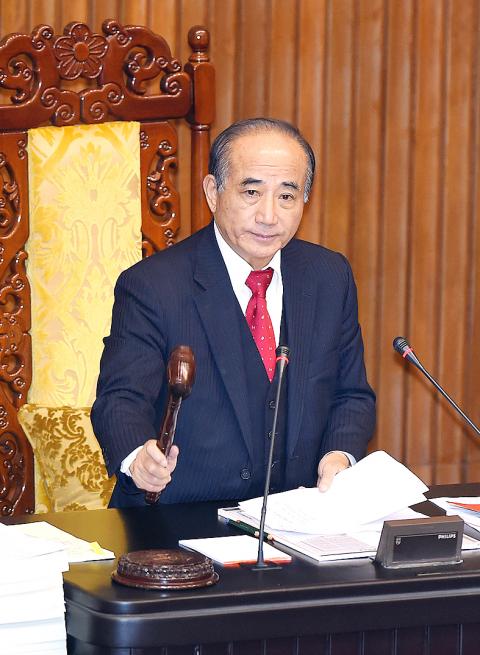The legislature passed an amendment to the Civil Servants Election and Recall Act (公職人員選舉罷免法) yesterday that lowered the threshold for the percentage of the vote political parties need to garner to receive government subsidies.
The threshold for government subsidies for parties’ campaign funding has been lowered from 5 percent to 3.5 percent of the votes a political party garners for legislators-at-large and overseas legislators, in the next legislative election.
“The subsidy ... shall be granted to the political party at a rate of NT$50 per vote every year” until the next legislative election, the amended act states.

Photo: Liao Chen-hui, Taipei Times
The amendment was proposed by the Taiwan Solidarity Union (TSU), who had earlier called for much lower thresholds of 1 percent or 3 percent, but compromised at 3.5 percent after encountering unyielding resistance from the Chinese Nationalist Party (KMT).
According to the statistical information provided by the Central Election Committee, the KMT, the Democratic Progressive Party (DPP), the TSU and the People First Party are the only four parties — with 44.55 percent, 34.62 percent, 8.96 percent and 5.49 percent of the vote obtained respectively — to have received subsidies following the 2012 legislative election.
With the lowering of the threshold, the Green Party and the New Party, which received 1.74 percent and 1.49 percent of the vote in 2012 respectively, would still not be subsidized if their percentage of the vote remains the same in the next legislative election.
“While the TSU did receive the subsidy, we believe that the lowering of the threshold is crucial for the survival and the participation of smaller political parties, which are mostly public-benefit-oriented,” TSU Legislator Lai Chen-chang (賴振昌) said. “It is a major step forward in the move toward more pluralistic politics.”

AIR SUPPORT: The Ministry of National Defense thanked the US for the delivery, adding that it was an indicator of the White House’s commitment to the Taiwan Relations Act Deputy Minister of National Defense Po Horng-huei (柏鴻輝) and Representative to the US Alexander Yui on Friday attended a delivery ceremony for the first of Taiwan’s long-awaited 66 F-16C/D Block 70 jets at a Lockheed Martin Corp factory in Greenville, South Carolina. “We are so proud to be the global home of the F-16 and to support Taiwan’s air defense capabilities,” US Representative William Timmons wrote on X, alongside a photograph of Taiwanese and US officials at the event. The F-16C/D Block 70 jets Taiwan ordered have the same capabilities as aircraft that had been upgraded to F-16Vs. The batch of Lockheed Martin

GRIDLOCK: The National Fire Agency’s Special Search and Rescue team is on standby to travel to the countries to help out with the rescue effort A powerful earthquake rocked Myanmar and neighboring Thailand yesterday, killing at least three people in Bangkok and burying dozens when a high-rise building under construction collapsed. Footage shared on social media from Myanmar’s second-largest city showed widespread destruction, raising fears that many were trapped under the rubble or killed. The magnitude 7.7 earthquake, with an epicenter near Mandalay in Myanmar, struck at midday and was followed by a strong magnitude 6.4 aftershock. The extent of death, injury and destruction — especially in Myanmar, which is embroiled in a civil war and where information is tightly controlled at the best of times —

Taiwan was ranked the fourth-safest country in the world with a score of 82.9, trailing only Andorra, the United Arab Emirates and Qatar in Numbeo’s Safety Index by Country report. Taiwan’s score improved by 0.1 points compared with last year’s mid-year report, which had Taiwan fourth with a score of 82.8. However, both scores were lower than in last year’s first review, when Taiwan scored 83.3, and are a long way from when Taiwan was named the second-safest country in the world in 2021, scoring 84.8. Taiwan ranked higher than Singapore in ninth with a score of 77.4 and Japan in 10th with

SECURITY RISK: If there is a conflict between China and Taiwan, ‘there would likely be significant consequences to global economic and security interests,’ it said China remains the top military and cyber threat to the US and continues to make progress on capabilities to seize Taiwan, a report by US intelligence agencies said on Tuesday. The report provides an overview of the “collective insights” of top US intelligence agencies about the security threats to the US posed by foreign nations and criminal organizations. In its Annual Threat Assessment, the agencies divided threats facing the US into two broad categories, “nonstate transnational criminals and terrorists” and “major state actors,” with China, Russia, Iran and North Korea named. Of those countries, “China presents the most comprehensive and robust military threat